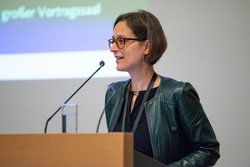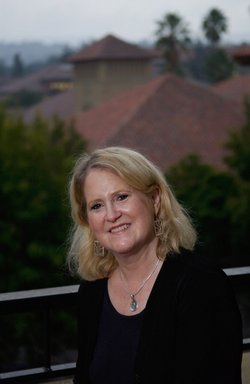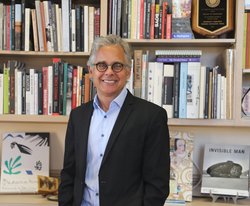Keynote Speakers



We are proud to announce the following keynote speakers.
Prof. Dr. Nassim W. Balestrini (University of Graz)
“Catching light in the dark”: Joy Harjo and Indigenous Poets as Cartographers of Crisis and Memory
The call for papers for this conference asks which ways of thinking and feeling characterize an Americanist’s research and teaching. This talk will take up the challenge to contemplate how specific ways of engaging with our field encourage us to explore specific ways of explaining and experiencing the arts. My particular version of being an Americanist includes encouraging my students to delve into contemporary poetry as a potentially powerful pathway towards understanding long-standing and current crises. To my mind, the signature projects of U.S. poet laureates of the last two decades offer ample material to embark on such mental journeys. Specifically, I will focus on the 23rd Poet Laureate Consultant in Poetry, Joy Harjo, and her online as well as book project Living Nations, Living Words. Harjo’s digital and analog project, which is available on the Library of Congress website and in book format, does much more than anthologize poems by 47 Indigenous American authors. By asking these poets to locate themselves—based on criteria of their own choosing—on a borderless map, by introducing readers and listeners to a Muscogee Creek approach to mapping (which predates Western cartographers’ attempts and which represents Harjo’s tribal affiliation), by making the poems available as sound recordings and as printed texts, Harjo opens cognitive and emotional doors that have been invisible and/or sealed shut by centuries of stereotyping American Indian nations. Thus, I will address how we—and here I mean the majority of students and colleagues who are non-Indigenous Europeans—can read these texts from within the ethos of our field of study “at a crucial time in history, a time in which the failures to acknowledge, listen to, and consider everyone when making the map of American memory has brought us to a reckoning” (Harjo, Introduction, Living Nations xvii).
Prof. Dr. Shelley Fisher Fishkin (Stanford University)
Can Literature Come to the Rescue when History Is Under Siege? How One Novel Can Be a Trojan Horse to Engage Questions Some Politicians Don’t Want Us to Ask
Teaching America’s past and present in all its complexity has never been an easy task—but this challenge itself is increasingly under attack in American schools. More than half of U.S. states have passed measures against the teaching of critical race theory—measures designed to discourage teachers from teaching their students about the role that racism has played in America. Art, however, can illuminate the truths that politicians who passed these laws prefer to bury—if we let it.
Mark Twain’s novel, Adventures of Huckleberry Finn can be a Trojan Horse able to open our classrooms to issues the politicians don’t want discussed. It offers a critical lens on America’s complex history, challenging readers to confront uncomfortable truths about racism and societal norms, and engaging them in profound discussions of race, morality, and empathy. Welcomed in the curriculum as a classic text by a canonical White American author, this searing satire on racism can bring the history of race in America into the classroom in engaging and powerful ways. But the book remains under constant threat of being banned by those who misread it as bolstering the racism that it attacks. Those who want the book banned view Jim, its central Black character, as irredeemably inflected by minstrelsy—an emblem of the author’s alleged racism. But my forthcoming book argues that Jim is a compelling challenge to minstrel stereotypes and racism itself, a shrewd and self-aware enslaved man seeking his freedom in a world determined to keep him enslaved and one of the first Black fathers in American fiction—someone we need to keep in our classrooms.
My talk will draw on arguments I make in Jim: The Life and Afterlives of Huckleberry Finn’s Comrade, forthcoming (April 2025) in Yale University Press’s “Black Lives” biography series edited by Henry Louis Gates, Jr., David Blight, and Jacqueline Goldsby. It will explore how engaging this text in fresh and creative ways and how probing its global travels (it has been translated into 67 languages) can help students understand the dynamics of racism—not just in the US but around the world, as well.
Prof. Dr. Steven D. Hoelscher (University of Texas at Austin)
Pictures at an Environmental Exhibition
In fall 2024, the Harry Ransom Center will present a major exhibition on the theme of environmental photography. “Visualizing the Environment: Ansel Adams and His Legacy” will study the work of a singularly important environmental photographer by placing it in a larger historical context. Ansel Adams’s photographs of soaring distant mountains, thick forests, meandering rivers, atmospheric clouds remain some of the most popular and immediately recognizable environmental images of our time. For those photographers who came after Adams, his legacy looms large. On the one hand, Adams helped raise an environmental consciousness about the land that still resonates, but at the same time, his depopulated scenes suggest that the landscape is best understood apart from people.
My keynote explores the creation of this exhibition, from initial conception to final installation and public opening. It tells the story of how art donations, gallerists, archival research, artist trusts, checklists, publicity, conservation, gallery preparation, all connect art, education, and American studies.
